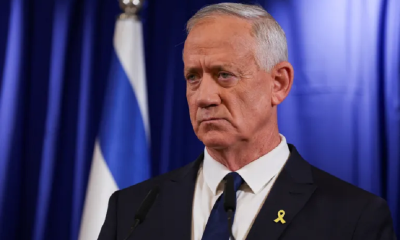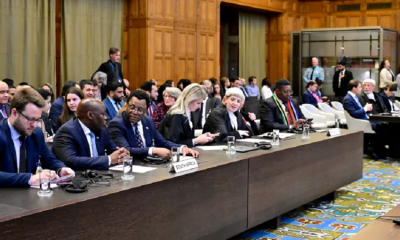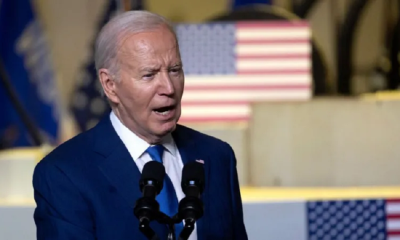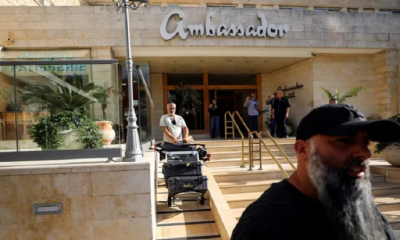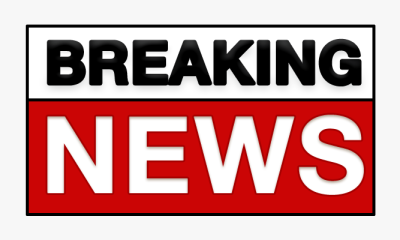Foreign News
Fears for Gazans as aid groups halt work over deadly Israeli strike
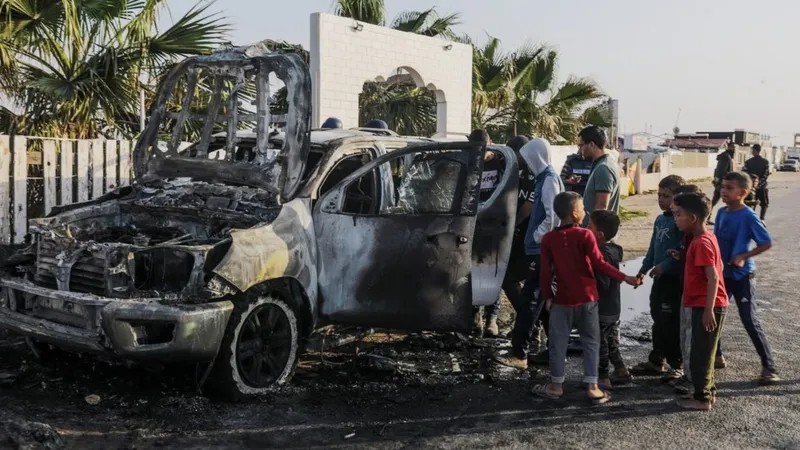
Many Palestinians in the Gaza Strip will be wondering how they are going to feed their families after World Central Kitchen (WCK) paused its operations in response to the killing of seven of its aid workers in an Israeli air strike.
Another US charity it works with, Anera, has also suspended work because of the escalating risks faced by its local staff and their families.
Together, they were serving two million meals a week across the Palestinian territory, where the UN has warned that an estimated 1.1 million people – half the population – are facing catastrophic hunger because of Israeli restrictions on aid deliveries, the ongoing hostilities and the breakdown of order.
WCK’s decision to pause its work also led to the “freezing” of a maritime aid corridor from Cyprus, which the charity helped set up last month to increase the trickle of aid getting into the north of Gaza and avert a looming famine.
The WCK convoy was hit on Monday night as it travelled south along the Israeli-designated coastal aid route, just after they had unloaded more than 100 tonnes of food from a barge at a warehouse in Deir al-Balah.
That barge was part of a four-vessel flotilla that sailed back to Cyprus with 240 tonnes of supplies that could not be brought ashore in the wake of the strike.
The Norwegian Refugee Council warned that “what happened to World Central Kitchen threatens the entire aid system” and had left it “on the brink”.

Before the strike, World Central Kitchen was providing about 350,000 meals across Gaza each day
WCK accused the Israeli military of a “targeted attack” on vehicles clearly marked with the charity’s logo and whose movements had been co-ordinated with Israel authorities. The victims were British, Polish, Australian and Palestinian, and also included a dual US-Canadian citizen.
The military’s chief of staff, Lt Gen Herzi Halevi, described the strike as a “grave mistake” that had followed “misidentification at night”.
He also vowed to take “immediate action” to ensure that more was done to protect aid workers, including the immediate establishment of a new “humanitarian command centre” to improve co-ordination. “Israel is at war with Hamas, not with the people of Gaza,” he stressed.
However, aid groups say they are not sure such promises will lead to meaningful changes. They also assert that this was not an isolated incident, with 196 Palestinian aid workers reportedly killed since the war began in October.
Jan Egeland, the secretary-general of the Norwegian Refugee Council and a former UN humanitarian chief, told the BBC that WCK was “among those who have the closest co-operation with the Israelis”, in terms of sharing information about their workers’ locations and planned movements.
Before the strike, WCK was playing an increasingly prominent and important role in Gaza, with 400 Palestinian staff and 3,000 people working indirectly in its 68 community kitchens and distribution system across the territory.
WCK provided 12% of the 193,000 tonnes of aid from international organisations that had reached Gaza as of Tuesday, according to data from Cogat, the Israeli defence ministry body tasked with co-ordinating deliveries. However, UN agencies were responsible for 80% of the total.
WCK’s founder, the chef José Andrés, told Reuters news agency on Wednesday that it was “analysing the situation and how to keep doing the work we do”.
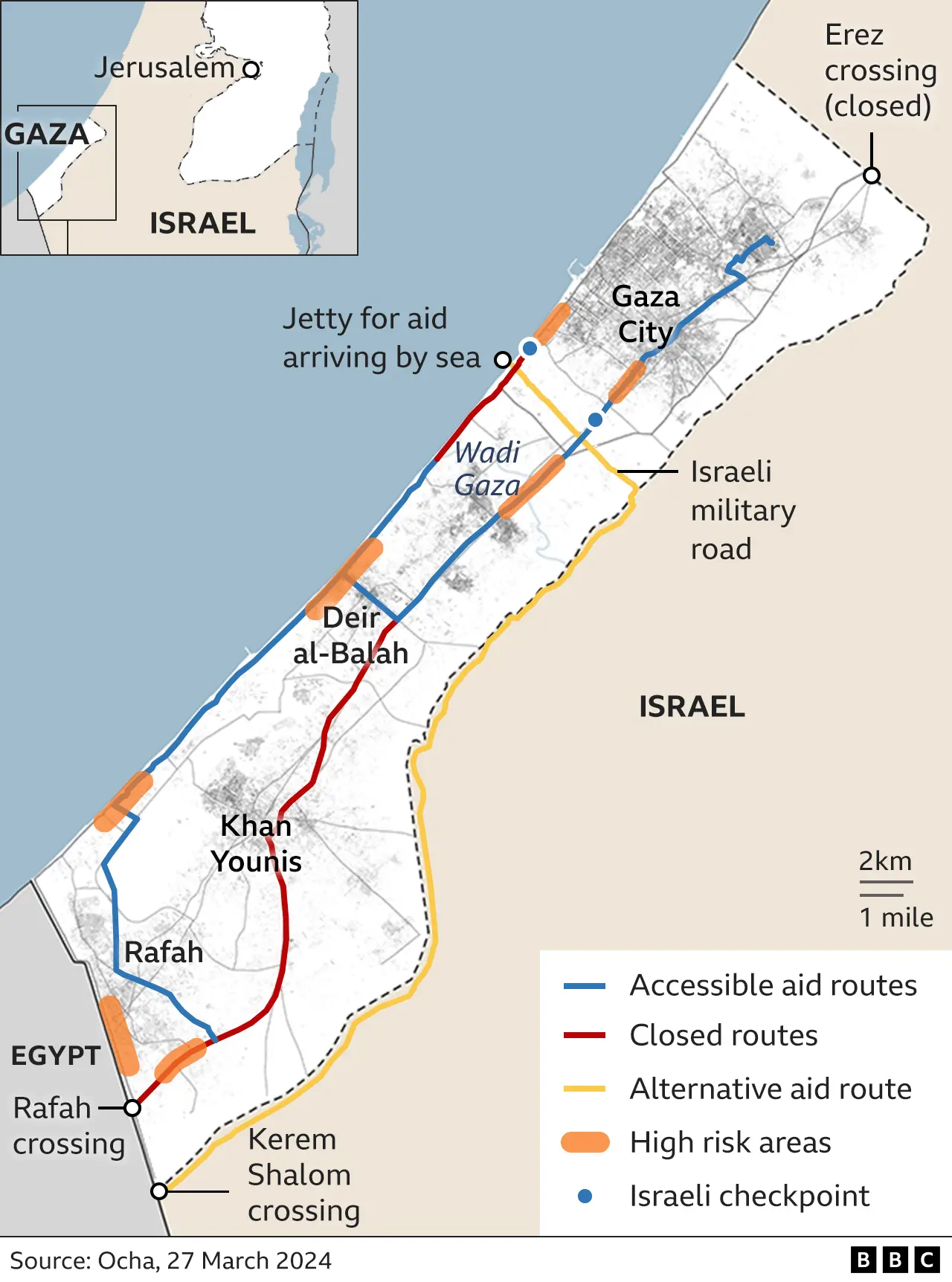
Anera – which was providing 150,000 meals a day in collaboration with WCK – said it understood the consequences pausing its own work would have on Palestinians, but that its Palestinian staff had for the first time deemed the risk to their safety and that of their families “intolerable”.
It said the charity’s logistics co-ordinator and his son had been killed in an Israeli air strike in Deir al-Balah in March, despite the fact that the co-ordinates of the shelter where they were staying had been provided to the Israeli military. “We’ve asked for explanation as to why that site was struck and we’ve received none,” Derek Madsen of Anera told the BBC. “These sites are known and so I think it is very difficult for us to understand how these strikes happen.”
For the people of Gaza, the suspension of WCK’s operations “means more famine, more dead children, more epidemic disease because people are so malnourished”, Mr Egeland warned.
At least 27 children are reported to have died as a result of malnutrition since October, according to the World Health Organization.
Mr Egeland urged Israel to start by opening the Karni and Erez border crossings with northern Gaza to allow aid convoys to drive there directly.
Most aid convoys are currently forced to start at the Israeli-controlled Kerem Shalom and Egyptian-controlled Rafah crossings with the south of Gaza and then pass through what the UN calls “high-risk areas”, mainly due to shooting and shelling or the breakdown in civil order.
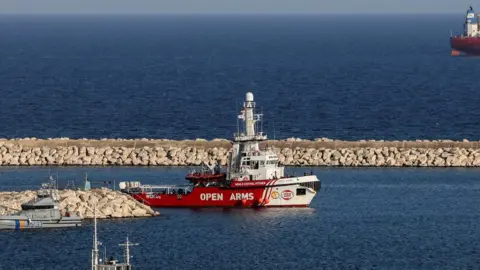
The Open Arms. a Spanish charity vessel, returned to Cyprus on Wednesday after the maritime aid route was suspended (BBC)
Cogat says Israeli forces have co-ordinated the entry of more than 500 lorries into the north over the past two months via those routes as well as a new gate and military road that runs south of Gaza City.
Israel has also facilitated the now-suspended maritime corridor set up by WCK as well as airdrops of aid by Western and Arab countries, which the UN says are both helpful but cannot replace the large-scale delivery of aid by land.
The first WCK aid ship was carrying 200 tonnes of aid and took several days to reach Gaza. By comparison, a lorry can carry about 20 tonnes and the nearest Israeli container port is only a 40km drive from northern Gaza.
A C-130 transport plane meanwhile has a maximum payload of 21 tonnes, but only about 40 airdrops have taken place so far and they are considered expensive, ineffective and dangerous for people on the ground.
The UN says 159 lorry loads of aid crossed into Gaza by land each day on average between 1 and 28 March, and that the pre-war average was 500 lorry loads, including fuel.
Cogat says the pre-war average only included 70 food lorries and that 140 entered each day during March. It insists there is no limit to the amount of food and other humanitarian aid that can enter Gaza and accuses UN agencies of failing to distribute aid effectively.
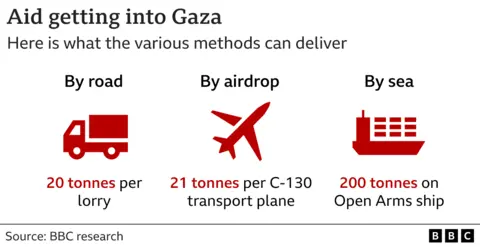
There was no apparent drop-off in aid crossing into Gaza following the strike on the WCK convoy, with 217 lorries transferred via Israel and Egypt on Wednesday and 179 food packages being airdropped, according to Cogat.
But Nate Mook, who was chief executive of WCK until 2022, warned that the longer-term consequences could be “devastating” for Gazans because “we probably have not seen the last of the aid organisations to pull out”.
Aseel Baidoun of Medical Aid for Palestinians said it had not suspended operations after a strike in January damaged a residential compound that housed the British charity’s local team and their families, injuring several people. But now, she added: “We really are scared of the security situation.”
Natalia Anguera of Action Against Hunger told the BBC that it would try to continue working despite “more and more challenging” conditions.
“Most of our staff are… Palestinians. They are suffering themselves, but they also have a very strong and clear commitment to their humanitarian mandate. They want to go on delivering,” she said.
She said the international community needed to push strongly for a humanitarian ceasefire because it was the only way that aid organisations would be able to scale up their response to the level required.
Mr Egeland also stressed the importance of the UN agency for Palestinian refugees (UNRWA), which he said was “bigger than the rest of us combined” but was being “systematically undermined by Israel”.
Israel accuses UNRWA of supporting Hamas, which triggered the war when its gunmen attacked southern Israel on 7 October last year. The agency has denied this, but in January it sacked nine of the 12 employees accused in an Israeli document of playing a part in the attacks.
UNRWA called for a “complete reversal in policies” from Israel in response to Monday’s strike, including lifting the ban on it delivering aid to northern Gaza.
(BBC)
Foreign News
China executes four more Myanmar mafia members
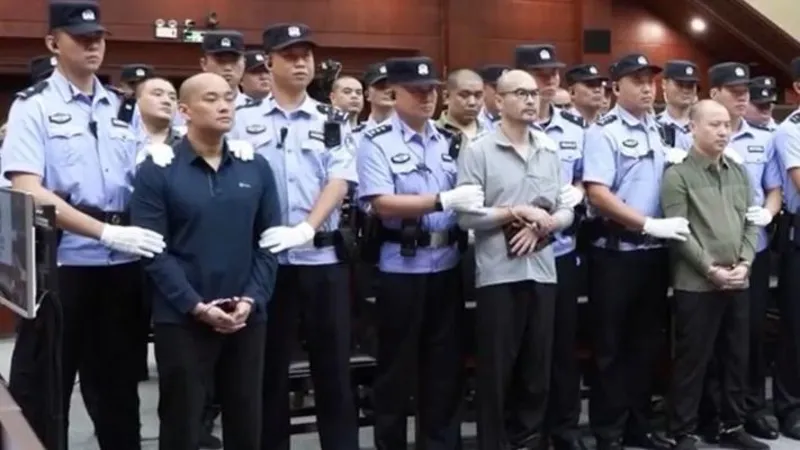
China has executed four members of the Bai family mafia, one of the notorious dynasties that ran scam centres in Myanmar, state media report.
They were among 21 of the family’s members and associates who were convicted of fraud, homicide, injury and other crimes by a court in Guangdong province.
Last November the court sentenced five of them to death including the clan’s patriarch Bai Suocheng, who died of illness after his conviction, state media reported.
Last week, China executed 11 members of the Ming family mafia as part of its crackdown on scam operations in South East Asia that have entrapped thousands of Chinese victims.
For years, the Bais, Mings and several other families dominated Myanmar’s border town of Laukkaing, where they ran casinos, red-light districts and cyberscam operations.
Among the clans, the Bais were “number one”, Bai Suocheng’s son previously told state media after he was detained.
The Bais, who controlled their own militia, established 41 compounds to house cyberscam activities and casinos, authorities said. Within the walls of those compounds was a culture of violence, where beatings and torture were routine.
The Bai family’s criminal activities led to the deaths of six Chinese citizens, the suicide of one person and multiple injuries, the court said.
The Bais rose to power in Laukkaing in the early 2000s after the town’s then warlord was ousted in a military operation led by Min Aung Hlaing – who now leads Myanmar’s military government.
The military leader had been looking for co-operative allies, and Bai Suocheng – then a deputy of the warlord – fitted the bill.
But the families’ empires crashed in 2023, when Beijing became frustrated by the Myanmar military’s inaction on the scam operations and tacitly backed an offensive by ethnic insurgents in the area, which marked a turning point in Myanmar’s civil war.
That led to the capture of the scam mafias and their members were handed to Beijing.
In China, they became subjects of state documentaries which emphasised Chinese authorities’ resolve to eradicate the scam networks.
With these recent executions Beijing appears to be sending a message of deterrence to would-be scammers.
Hundreds of thousands of people have been trafficked to run online scams in Myanmar and elsewhere in South East Asia, according to estimates by the United Nations.
Among them are thousands of Chinese people, and their victims who they swindle billions of dollars from are mainly Chinese as well.
(BBC)
Foreign News
US government partially shuts down despite last minute funding deal

The US federal government has partially shutdown despite a last-ditch funding deal approved by the Senate.
The funding lapse began at midnight US eastern time (05:00 GMT) on Saturday, hours after senators agreed to fund most agencies until September. The bill includes just two weeks’ funding for the Department of Homeland Security, which oversees immigration enforcement, instead of shutting it down entirely.
The bill has yet to be approved by the House of Representatives, which is out of session.
US President Donald Trump struck the deal with Democrats after they refused to give more funding for immigration enforcement following the fatal shooting of two US citizens in Minneapolis by federal agents.
It is the second such government shutdown in the past year and comes just 11 weeks after the end of the previous funding impasse that lasted 43 days, the longest in US history.
That shutdown in 2025, which spanned 1 October to 14 November, had widespread impacts on essential government services including air travel and left hundreds of thousands of federal workers without pay for weeks.
This shutdown, however, is unlikely to be that long or widespread as the House of Representatives is set to be back in session on Monday.
The White House, though, has directed several agencies, including the departments of transportation, education and defence to execute shutdown plans.
“Employees should report to work for their next regularly scheduled tour of duty to undertake orderly shutdown activities,” a White House memo to agencies said. “It is our hope that this lapse will be short.”
Trump has urged Republicans, who hold the majority of seats in the US House, to vote for the deal.
Lawmakers plan to use the fortnight in which the DHS will continue to be funded to negotiate a deal. Democrats want that deal to include new policies for immigration enforcement agents.
“We need to rein in ICE and end the violence,” Senate Minority Leader Chuck Schumer said referring to Immigration and Customs Enforcement.
“That means ending roving patrols. It means requiring rules, oversight, and judicial warrants… Masks need to come off, cameras need to stay on, and officers need visible identification. No secret police.”
Both Republican and Democratic lawmakers have sharply criticised tactics used by immigration agents in the wake of the fatal shooting of Alex Pretti in Minneapolis last weekend.
Pretti, an intensive care nurse, was shot by a US Border Patrol agent after an altercation in which several agents tried to restrain him.
On Friday, the Justice Department launched a civil rights investigation into the shooting.
[BBC]
Foreign News
Heavy gunfire and blasts heard near airport in Niger’s capital
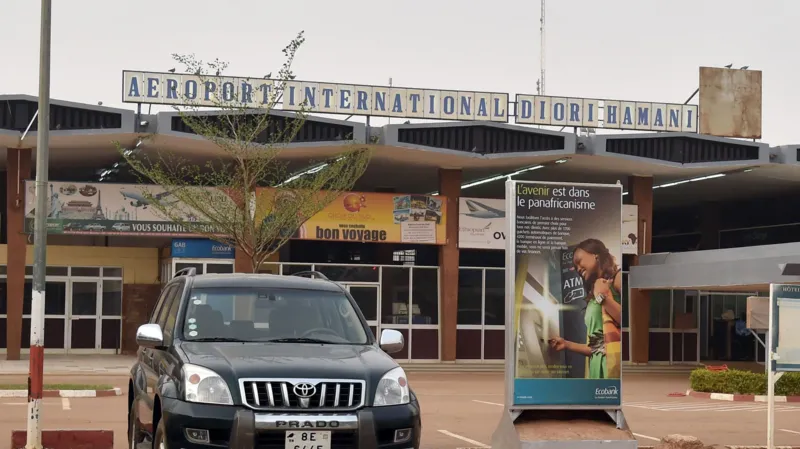
Sustained heavy gunfire and loud explosions have been heard in Niger near the international airport outside the capital, Niamey.
Multiple eyewitness accounts and videos showed air defence systems apparently engaging unidentified projectiles in the early hours of Thursday.
The situation later calmed down, reports say, with an official reportedly saying the situation was now under control, without elaborating.
It is not clear what caused the blasts, or if there were any casualties. There has been no official statement from the military government.
The gunfire and blasts began shortly after midnight, according to residents of a neighbourhood near the Diori Hamani International Airport, the AFP news agency reports. They said calm returned after two hours.
The airport houses an air force base and is located about 10km (six miles) from the presidential palace.
Niger is led by Abdourahamane Tiani who seized power in a 2023 coup that ousted the country’s elected civilian president.
Like its neighbours Burkina Faso and Mali, the country has been fighting jihadist groups who have carried out deadly attacks across the region.
It is also a major producer of uranium.
A huge uranium shipment destined for export has been stuck at the airport amid unresolved legal and diplomatic complications with France after the military government nationalised the country’s uranium mines.
“The situation is under control. There is no need to worry,” the Anadolu news agency quoted a Foreign Affairs ministry official as saying, without elaborating.
The official told the agency they were trying to determine whether the gunfire was linked to the uranium shipment.
[BBC]
-

 Opinion5 days ago
Opinion5 days agoSri Lanka, the Stars,and statesmen
-

 Business6 days ago
Business6 days agoClimate risks, poverty, and recovery financing in focus at CEPA policy panel
-

 Business4 days ago
Business4 days agoHayleys Mobility ushering in a new era of premium sustainable mobility
-

 Business1 day ago
Business1 day agoSLIM-Kantar People’s Awards 2026 to recognise Sri Lanka’s most trusted brands and personalities
-

 Business4 days ago
Business4 days agoAdvice Lab unveils new 13,000+ sqft office, marking major expansion in financial services BPO to Australia
-

 Business4 days ago
Business4 days agoArpico NextGen Mattress gains recognition for innovation
-

 Business3 days ago
Business3 days agoAltair issues over 100+ title deeds post ownership change
-

 Business3 days ago
Business3 days agoSri Lanka opens first country pavilion at London exhibition


